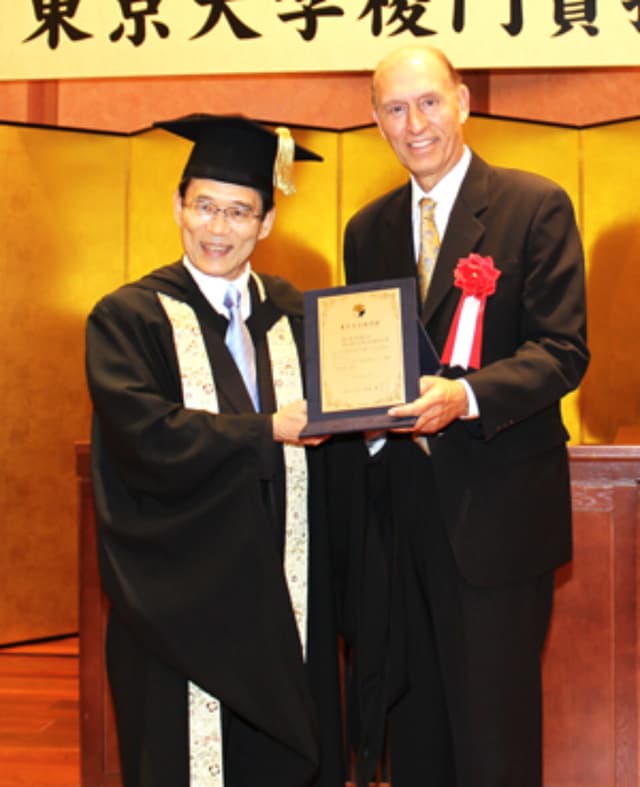University of Tokyo Honors Kavli Foundation and Nissin with Shokumon Awards

(Originally published by the University of Tokyo)
October 3, 2012
In an award ceremony on Tuesday, 2 October 2012, The Kavli Foundation (United States) and the Nissin Food Products Co. Ltd. were each presented the “Shokumon Award” by the University of Tokyo (Todai).

The Shokumon Award recognizes and thanks individuals, corporations, and organizations that have made a major contribution to the growth of the University, either through private donations, volunteer work and support, or the establishment of endowed chairs and research centers. Regarding the award Todai President Junichi Hamada said, “It is crucial for the University of Tokyo to be closely connected to society at large rather than a closed ivory tower. Openness and Sustainability are two of the pillars of my vision for the University. We highly appreciate support from the individuals and groups that make our program sustainable in the long run, especially when the government support to the national universities is slowly dwindling. It is a great privilege to recognize through these Shokumon Awards the wonderful support we have received from The Kavli Foundation and Nissin Food Products.”
The Kavli Foundation is the first international recipient of the Shokumon Award. The Foundation supports basic research in the areas of astrophysics, neuroscience, nanoscience, and theoretical physics. Through endowments, to date it has established sixteen Kavli Institutes around the world. The endowment of the Kavli Institute for the Physics and Mathematics of the Universe (Kavli IPMU) within Todai was announced earlier this year and the Shokumon award recognizes this gift. Kavli IPMU studies most basic questions about the Universe based on interdisciplinary approach using astronomy, physics, and mathematics. Other programs established by the Foundation include professorships, symposia, and collaborations with academic organizations such as the US National Academy of Sciences and The Royal Society (United Kingdom). It is also a founding partner of the biennial Kavli Prizes in astrophysics, nanoscience and neuroscience.

“By presenting the Shokumon Award to The Kavli Foundation, the University of Tokyo has bestowed on us a great honor,” said Fred Kavli, Founder and Chairman of the Foundation. “I think the Kavli IPMU will be a shining star among the Kavli Institutes.”
In receiving the award from Todai, the Foundation’s President Robert W. Conn said, “We chose Todai for our gift because of your extraordinary academic history and your sustained commitment to science. We were, and we are, impressed by the leadership and vision of Todai to find a new way forward – a more international way forward – for Japan. The initiative of President Hamada to shift the academic year to begin in the fall instead of the spring will help the university attract international scholars and students.”
President Koki Ando received the Award on behalf of Nissin Food Product Co. Ltd., the internationally-famous Japanese food company. The company donated funds to support research on “taste science” for five years in the Graduate School of Agricultural and Life Sciences, Department of Applied Biological Chemistry, and this year they made an additional donation for another five-year period. Out of the five basic tastes, sweetness, bitterness, umami, sourness, and saltiness, the taste receptors for the latter two are unknown. The research funded by Nissin has led to the discovery of a candidate taste receptor for sourness.
The “Shokumon Award” was instituted in 2002 to recognize and thank individuals, corporations, or organizations that made major contributions to the growth of the University programs through private donations, volunteer work and support, establishment of endowed chairs or research centers. Recipients are chosen by an internal committee that has carefully reviewed the significance of the contributions, with current faculty members and students not eligible for the award. “Shokumon” is the name of the castle gate in the capital of the ancient Chinese state Qi during the civil war era (403-221 B.C.). Under King Wei (356-320 B.C.) and King Xuan (319-300 B.C.), the state treated academics very well, which brought the best minds to the capital Linzi of Qi and lead to a flourishing of academic activities. The area around the Shokumon gate was called “Shokuka”, where many academics gathered together, and the term “Shokuka intellectuals” was coined. The award is named after this history.